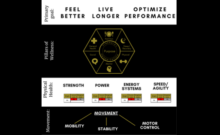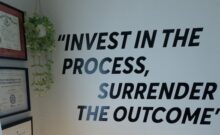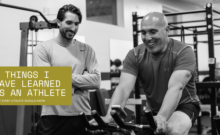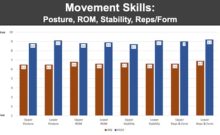
One of my biggest pet peeves as an athlete for so many years was the feeling of being restricted by my training program. I always felt that I was at the mercy of the training regime set by my coaches, and there was very little room to manoeuvre or experiment within it.
As I matured as an athlete, I began to spend more time experimenting and tinkering with things in my game. I did this for no other reason than just wanting to have fun and enjoy the process a bit more, but I actually found some of those experiments turned into unique and creative things that I wanted to keep in my game!
So as a coach, I am a big believer in trying new things and working with the athlete’s intuition. Why? Because I have come to learn through my continued studies in sports science that there are very few TRUTHS when it comes to performance training. Instead, what we do have are guiding PRINCIPLES. What this means is that there is no such thing as the perfect program, the perfect workout, or the perfect set/ rep scheme. Instead, there are ideas and concepts, which we try to apply to a given context given the information we have available.

So about two months ago one of my athletes came to me wanting to experiment with keto. Now, most of you know I am not a big fan of keto or extreme style diets. Not because I don’t think they can work, but more because I question their sustainability for most people over the long term, and I generally believe there is an easier way to reach your goal (whether that is performance or weight related). Either way, he initiated it, and I supported it as an experiment. For context, his goals are entirely around strength and body composition.
For 2 months, he was a beast on it. He lost an extra 4.5lbs (which he had been really struggling to take off), and he could feel small changes in body composition. But after 2 months he really noticed his performance in the weight room trailing off. He reported feeling fatigued and like there was no gas in the tank to push at the end of the workout.
Without blinking, I knew the issue was a lack of carbohydrate in his diet because I had experienced this same thing myself. I sat him down and explained how carbohydrate fuels the glycolytic system, which is directly related to high intensity effort. I also explained how not giving your body the right fuel would impact performance, which impacts weight lifted, which impacts strength and body composition (his two central goals). At the end of the conversation he decided he wanted to put carb back in his diet. I told him if we were going to do it we would do it in the most scientific way possible.
So we waited 2 weeks until he was entering a max strength phase. For week 1 we kept him on Keto, and week 2 we added in healthy carbs with proper meal timing recommendations. I had programmed 10 sets of 1 rep with a 10 second eccentric as his central lift, so we had a very reliable control. Results recorded as follows:
| Exercise | Week 1 (on Keto) (max lift, 10,0,X,0) | Week 2 (added carbs) (max lift, 10,0,X,0) |
| BB Bench Press | 140 | 160 + 1 bonus rep |
| BB Back Squat | 150 | 175 |
| Deadlift | 135 | 160 |
Now, anyone who lifts weights will appreciate how staggering these changes are. Most people will train for 12 weeks and hope for a 5% change in strength. This athlete got a 15-20% change over the course of one week, with the simple introduction of carbs (and YES, we controlled every other variable). He told me he could totally feel a different level of energy and that he had more “umph” to lift heavy.
In our debrief, the athlete and I came up with a list of takeaways from this experiment:
- Carbs fuel high intensity effort
- There is nothing inherently wrong with carbs (as many will make you fear), but the timing, content, and ratio of carb intake needs to be built more holistically around your goal
- Carb timing around workouts is especially beneficial to performance
- Freezing meats and pre planning meals is key to his success and sustainability
Now, with these lessons learned, the athlete has re-introduced carbs back into his daily diet. He feels better, he is lifting better, he notes that it’s easier, and guess what? He has been able to maintain his weight loss calorie goal, and in fact he has lost an additional 4lbs since putting cabs back into his diet (now reaching his all time low!!). In his words, “it just has to be done intelligently.”
These are lessons that would normally take years and many textbooks to learn this deeply. But now, after this one experiment, this athlete is that much more informed and equipped to make decisions about his nutrition going forward for the rest of his life. So I am deeply supportive of my athletes experimenting, but if we’re going to do it we have to do it right.





